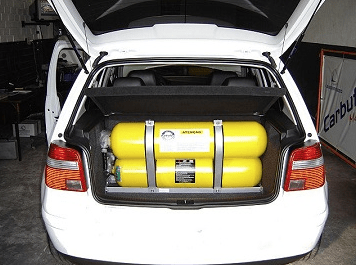From Ndubuisi Orji, Abuja
The House of Representatives has resolved to probe the explosion of Compressed Natural Gas (CNG) cylinders in Edo State and other parts of the country to identify the causes and measures to prevent future occurrences.
The House also resolved to enact legislation to regulate the production, installation, and use of CNG tanks and systems in vehicles and ensure that they meet international standards.
Similarly, the House urged the Nigeria National Petroleum Company Limited (NNPCL) and the Standards Organisation of Nigeria (SON) to collaborate on the enforcement of strict certification standards for the production and installation of CNG tanks.
The Greek chamber, which charged the NNPCL and SON to ensure that only qualified and accredited workshops are authorised to carry out CNG vehicle conversions, also urged the Nigerian Institute of Welding (NIW) and other relevant agencies to develop training and certification programs for local artisans and workshops involved in CNG tank fabrication and installation.
The House, while stating that this is to ensure that “only certified professionals handle such highly sensitive tasks,” called for mandatory inspection and certification programmes for all vehicles using CNG.
This followed the adoption of a motion by the member representing Surulere Federal Constituency 1 of Lagos State, Faud Laguda, at Wednesday’s plenary on “the urgent need for legislation to back the Presidential CNG Initiative to avert further carnage leading to loss of lives due to production of locally fabricated CNG tanks by artisans.”
Laguda, while leading the debate on the motion, informed the House that the Presidential CNG Initiative, introduced by President Bola Tinubu’s administration, is intended to cushion hardship arising from the removal of fuel subsidies.
However, the lawmaker expressed worry that the absence of a regulatory framework for “local fabrication, installation, and inspection of CNG cylinders is causing a surge in the production of substandard tanks by unqualified artisans.” According to him, this has led ” to avoidable explosions and loss of lives. “
“CNG has proven to be a sustainable and viable alternative fuel for transportation in many countries worldwide, but its safe use hinges on proper manufacturing, installation, and inspection of the CNG tanks and systems used in vehicles.
“There have been over 2000 conversions of vehicles to CNG across the nation, with zero explosion incidents coming from any of these conversions that were done in verified and certified conversion centres.
“Worried that the recent tragic incident in Edo State, where an explosion of a locally fabricated CNG cylinder, in a bid to cut corners, resulted in the loss of lives, numerous injuries, and property damage, has highlighted the critical need to address the safety and integrity of CNG tanks produced and used in Nigeria,” Laguda stated.
